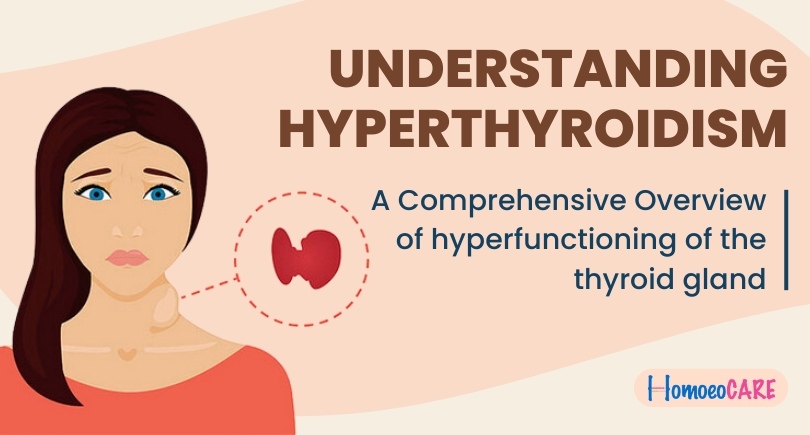In this blog, we will try to understand the complex disease of hyperthyroidism. We will see what the types of hyperthyroidism are, the symptoms of hyperthyroidism and finally what are the conventional ways to manage hyperthyroidism and how homeopathic treatment for hyperthyroidism will be a great boon.
- Hyperthyroidism
Hyper means increase and Thyroid means the thyroid hormone. So, Hyperthyroidism means an overproduction of thyroid hormones by the thyroid gland. This is the opposite of Hypothyroid which means underproduction of the Thyroid Hormone.
- Thyrotoxicosis
When the thyroid gland produces an excessive number of thyroid hormones it is called Thyrotoxicosis.
- Primary Hyperthyroidism
Primary hypothyroidism means the disease is caused by a problem within the thyroid gland itself, leading to the overproduction of thyroid hormones.
- Secondary Hyperthyroidism
Secondary Hyperthyroidism means the thyroid is overstimulated by thyroid-stimulating hormone (TSH), which originates from the hypothalamus or pituitary gland, resulting in excessive production of the thyroid hormone.
- Grave’s Disease
Grave’s disease is an autoimmune disorder where abnormal antibodies (TSH receptor antibodies) stimulate the thyroid gland, causing hyperthyroidism. This is the most common cause of hyperthyroidism.
- Toxic Multinodular Goiter (Plummer’s Disease)
This condition involves the development of nodules in the thyroid gland that function independently of the body’s normal hormonal feedback system, leading to excessive thyroid hormone production.
- Exophthalmos
A condition often associated with Graves’ disease, characterized by bulging eyeballs due to inflammation and swelling of the tissues behind the eyes.
- Pretibial Myxedema
It’s a dermatological condition linked to Graves’ disease, where abnormal tissue deposits under the skin of the lower legs lead to a waxy, swollen appearance.
Symptoms of Hyperthyroidism
Following are the symptoms of Hyperthyroidism:
- Anxiety and Irritability
- Sweating and Heat Intolerance
- Tachycardia (Fast Heart Rate)
- Weight Loss
- Fatigue
- Frequent Loose Stools
- Sexual Dysfunction
Symptoms of Graves’ Disease
Graves’ disease, driven by TSH receptor antibodies, presents with:
- Diffuse Goiter (without nodules)
- Thyroid Eye Disease (Exophthalmos)
- Pretibial Myxedema
Symptoms of Toxic Multinodular Goiter
This condition is typically seen in patients over 50 and is characterized by:
- Goiter with Firm Nodules (detectable upon thyroid examination)
- It is the second most common cause of thyrotoxicosis.
Solitary Toxic Thyroid Nodule
This occurs when a single thyroid nodule independently produces excessive thyroid hormones. These nodules are generally benign and can be effectively treated by surgical removal.
De Quervain’s Thyroiditis
This condition is often triggered by a viral infection and presents with:
- Fever, Neck Pain, and Tenderness
- Dysphagia (Difficulty Swallowing)
- Hyperthyroid Symptoms
De Quervain’s thyroiditis usually follows a self-limiting course, transitioning from a hyperthyroid phase to a hypothyroid phase before normal thyroid function is restored.
Thyroid Storm
Thyroid storm, or thyrotoxic crisis, is a rare and severe form of hyperthyroidism, marked by:
- High Fever (Pyrexia)
- Tachycardia
- Delirium
This condition requires immediate medical attention and hospitalization for intensive monitoring and treatment.
Management of Hyperthyroidism
The management of hyperthyroidism involves a comprehensive strategy:
- Antithyroid Drugs: Carbimazole is the first-line treatment, especially for Graves’ disease. It usually normalizes thyroid function within 4-8 weeks. The treatment approach can either be titration block (adjusting the dose to maintain normal hormone levels) or block and replace (completely blocking hormone production and supplementing with levothyroxine).
- Propylthiouracil: This is the second line of treatment and is used similarly to carbimazole but carries a higher risk of side effects on the liver. Hence it is a secondary option.
- Radioactive Iodine Therapy: In this therapy the patients ingest a radioactive iodine solution, which is absorbed by the thyroid gland, leading to a gradual reduction in thyroid hormone production. However, the Side effect of this treatment is that it can result in a state of hypothyroidism.
- Beta Blockers: To manage other symptoms of hyperthyroidism like palpitations and increased heart rate, beta-blocker medicines like propranolol are used.
- Surgery: In some cases, it may be required to partially or fully remove the thyroid gland through surgery. Post-surgery, patients will require lifelong thyroid hormone replacement therapy.
This is a comprehensive understanding of hyperthyroidism where we have outlined the Types of hyperthyroidism, Common symptoms of hyperthyroidism, various other complications of hyperthyroidism and finally the allopathic management of hyperthyroidism. However, there are many side effects of conventional management of hyperthyroidism. This also requires you to take allopathic medicines for a lifelong life. Hence at HomoeoCARE, we recommend natural and holistic homeopathic treatment for Hyperthyroidism. During the homeopathic treatment of hyperthyroidism, we aim to taper your allopathic medicines and replace these with natural homeopathic medicines and finally freedom from chemical tablets enjoying a healthy life.

